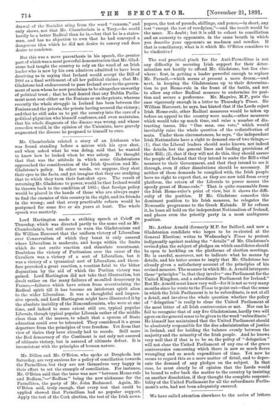Mr. Arthur Arnold (formerly M.P. for Salford, and now a
Gladstonian candidate who hopes to be re-elected at the General Election) writes to Wednesday's Times to protest indignantly against making the " details " of Mr. Gladstone's• revised plan the subject of pledges on which candidates should be open to heckling on the platforms of election meetings.. He is careful, moreover, not to indicate what he means by details, and his letter seems to imply that Mr. Gladstone has already given a satisfactory account of the principles of his. revised measure. The manner in which Mr. A. Arnold interprets these " principles " is, that they involve " one Parliament for the United Kingdom, and a subordinate Parliament for Ireland." But Mr. Arnold must know very well—for it is not so very many months since he wrote to the Times to point out—that the sense in which the Irish Parliament is to be subordinate, is not at all a detail, and involves the whole question whether the policy of "delegation" is really to clear the United Parliament of the most bitter of all Irish controversies or not. Nor can he fail to recognise that of any five Gladstonians, hardly two will agree on the general sense to be given to the word " subordinate.''' He himself has maintained that the United Parliament should be absolutely responsible for the due administration of justice in Ireland, and for holding the balance evenly between the majority and the minority of the Irish people. And he knows very well that if that is to be so, the policy of " delegation"' will not clear the United Parliament of any one of the grave controversies concerning which there is now so much fierce wrangling and so much expenditure of time. Yet now he seems to regard this as a mere matter of detail, and to depre- cate the demand of any pledges on the subject. In that. case, he must clearly be of opinion that the Lords would be bound to refer back the matter to the country by insisting on another dissolution, if they thought the complete responsi- bility of the United Parliament for all the subordinate Parlia- ment's acts, had not been adequately ensured.


















































 Previous page
Previous page